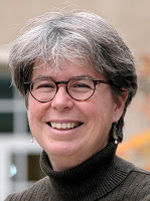Sancta sanctis. “God’s holy gifts, for God’s holy people.” So intones the celebrant at an Eastern Rite Mass as he elevates the Body and Blood of Christ before the reception of Communion. At this moment, in the presence God, who was given up for us, given to us, we are named sancti, the holy ones of God. Saints.
In one dusty corner of my mind, the Solemnity of All Saints reminds me of the times I dug up odd props for my kids to carry — carpenter’s squares and swords, pilgrim’s staffs and fish — as they dressed up as various saints for plays and pageants. At other moments, I am reminded of my mother’s face as her six children and husband of nearly 50 years gathered around her bed, calling upon all the saints as she went to join them. Sancta Maria, ora pro nobis. St. Joseph, pray for us.
Where my imagination fails is seeing myself as a saint, able to grasp what St. John says in the second reading for All Saints, “See what love the Father has bestowed on us that we may be called the children of God.”
I sympathize with the anonymous Carthusian monk, who in his homily for All Saints says, “The trouble is that we are called to be saints, not just good people … we are called to be holy as God is holy.” As difficult as it can be to be virtuous, to be wise, to avoid hurting others, the call to sainthood seems to demand yet more of us.
[hotblock]
Would I recognize a saint if I met one in the street? Or saw one in the mirror? What makes a saint? Virtues, certainly. Hope, faith, and love. Good works, of course. Mercy and justice. Or are these just the fruits of holiness, wonders my nameless Carthusian, what happens to a saint along the way?
Perhaps sainthood begins not with the determination to be virtuous, but with a spark of grace struck in a soul. Do we begin to be saints when we notice something of God’s Spirit burning within us and choose to return it freely and wholly to the Lord? When we elect to open our hearts so that the light within streams forth, more and more freely?
What makes a saint? It’s the response to the psalm for All Saints that tells us, I think. “Lord, this is the people who longs to see your face.” Who can stand in God’s holy place? The psalmist enumerates some of the virtues expected of a saint, but in the end says such virtues are characteristic of those who seek the face of the God of Jacob.
Origen, a third century theologian and Father of the Church, in reflecting on the 24th psalm implies that our yearning to experience the fullness of God is what changes us, what impels us to virtue and to mercy, what makes us saints. To walk in the way of perfection, is to walk toward God.
On this solemnity of saints recognized and unrecognized, hear St. Augustine’s challenge to become what you receive. Sancta sanctis. See what is holy. Become holy. Long to be a saint.
***
Michelle Francl-Donnay is a member of Our Mother of Good Counsel Parish, Bryn Mawr.
PREVIOUS: How many times a day can one receive Communion?
NEXT: Vatican, American Bible Society offer ‘lectio divina’ manual




Share this story